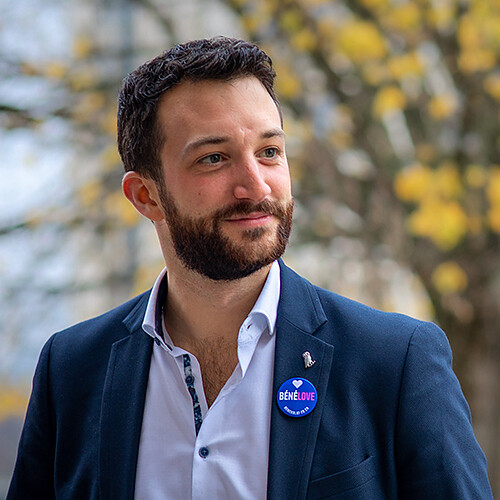After studying governance in Burma, working in the governance of Swiss academic institutions should be a breeze. Jérémie Sanchez talks about how he moved into a managing position, and how he maintains an academic posture, curiosity and interests.
Dr Jérémie Sanchez
Jeremie Sanchez worked at the Faculty of Geosciences and Environment (FGSE) until 2021, on urbanization and governance in the global South. In his doctoral research at IGD « Beneath the latrines of Mandalay Sanitation government and urban political ecological change in Myanmar », he used as an entry point the sanitation governmence in the city of Mandalay in Burma. At the crossroads of Human Geography, Urban Studies and Development Studies, his approach mobilized interdisciplinary approaches.

What is your current position?
I am currently quality manager at the Haute École pédagogique Fribourg. It is a position attached to the rectorate, whose main mandate is to coordinate all internal evaluation and continuous improvement activities. For example, I implement the evaluation of teaching by students, the biannual management retreats (where the institution's executives take a closer look at its management) and the development plans of the sectors and departments. It is also my department that deals with all aspects of institutional accreditation (in accordance with the LEHE, the law on the promotion of higher education), and more generally with the promotion of a quality culture within the university.
Why did you choose this path?
To be honest, the path chose me. COVID and the 2021 coup in Burma put a stop to my postdoctoral ambitions: I had obtained an SNSF grant to continue my research on environmental activism in the country, but as the project was no longer feasible, I had to decline it. After going through several short and low-rate contracts with UNIL, UNIFR and UNIBE as well as unemployment, I saw this position at HEP Fribourg and took my chances. As the institution was at the beginning of its institutional accreditation process and I had been twice an external evaluator for the federal accreditation agency (AAQ) in parallel with my thesis, they recruited me.
What do you like about your current job?
Although I still have a twinge when I think of Burma today, I think that this professional change has brought me a lot. Already during my studies and my thesis I was very interested in the governance of UNIL and Swiss academic institutions. In my current position, I have the chance to work daily with all the different professions and audiences that make a university live, which is fascinating because it gives me a real 360° view of the institution. Moreover, as quality assurance is a field of activity that is still sometimes poorly understood, or even disparaged in higher education, it is a great intellectual and human challenge for me to make it understandable, useful and "sexy"! And I really like challenges.
Do you use any of the skills you developed at FGSE?
The most important skill in my work today is systems thinking: any decision relating, for example, to the evaluation of teaching will have operational implications for the IT department, will generate costs to be passed on to the budgets, will trigger more or less emotional reactions among the teaching staff, will affect the students' relationship with the latter, etc. In quality assurance, one must constantly try to take into account all parameters, all aspects of the governance of a university. At a more basic level, managing projects autonomously and efficiently is also a fundamental skill that I was able to develop during my thesis and that I use every day.
When you came to the FGSE, what was your motivation?
In 2012 (which does not make us younger...), I joined the MSc in Geography, Urban Studies to deepen the knowledge acquired during my BSc in Urban Planning obtained in Lyon. However, I quickly changed direction, as I discovered the "Development Studies" specialization, which matches my interest in social and environmental issues in the South, as well as in international cooperation.
Today, how do you relate to your former work at the FGSE?
Although the link may not be obvious at first glance, quality assurance and development cooperation have a lot in common: the logic and "good intentions" of institutional improvement that underlie both fields are similar, as are the risks of technocratic and neoliberal drifts that accompany them. In this sense, what I learned at the FGSE now serves as a safeguard and an ethical guideline in my work. This is also what guides my parallel volunteer work: since 2020, I am the president of Bénévolat Fribourg Freiburg, the competence centre for non-profit organizations in the canton of Fribourg.
On a more personal level, I keep in touch with the colleagues and friends I was closest to during my fieldwork in Burma – most of them have gone to study or work abroad since the coup – and I try to support them as much as I can. I'm a little better able to do that now that I'm out of post-doctoral insecurity and have a stable job and income.
Tell us about your transition from a professional to an extra-academic role.
I'm not sure I've made the transition completely! If my role is indeed formally administrative at the HEP Fribourg, I remain in a relatively academic position: I have (re)started to read scientific literature in the field of quality assurance and governance of higher education institutions, we are writing an article with a colleague. I even asked to take on a small teaching load, because I missed it. Moreover, I will very soon join the HEP Vaud as a teaching assistant (equivalent to MER at UNIL) and quality assurance officer: an academic position that combines teaching, applied research and support to the institutional management of a university. Everything I like!
Interview published on March 31, 2023.
